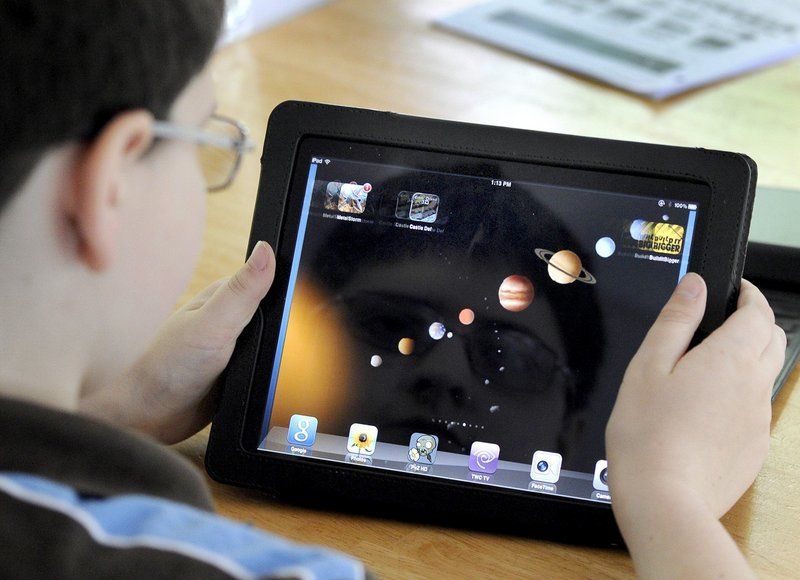AUGUSTA — Maine students entering seventh- and eighth-grade next fall could be handed Apple iPads instead of the laptops that defined the state’s pioneering technology program.
The state, which is preparing to renew the contract for supplying public schools with new technology, sought proposals for tablets as well as laptops.
The iPad is the least expensive option, and the state says they are powerful enough to do everything required of students, although some aren’t sold on the idea that students would best benefit from tablets.
Officials in charge of the Maine Learning Technology Initiative are keeping the options open. Sixteen proposals were recruited last year, and were winnowed down to five, two for tablets and three for laptops.
Maine’s initiative, the first of its kind in the nation, was a main policy initiative of former Gov. Angus King, now Maine’s junior U.S. senator. The program began in 2002 as a way to promote technological literacy.
Michael Thurston, a social studies teacher at Winslow High School, has two main concerns with tablets: They could limit students’ functionality and lead to technological inequality among students, since those who have laptops at home may gain an edge on assignments that are not as easily completed with school-issued tablets, he said.
“For a percentage of our students, this may be their only access to technology,” he said. “I don’t want to create a have- and have-not situation with technology where we don’t really have that right now.”
One drawback of the iPad, said David Connerty-Marin, spokesman for the Maine Department of Education, is writing on it. The tablet’s touch-screen keyboard is difficult to use for writing at length. He said the contract includes some external keyboards, but not one for every device, and buying more would add to the cost.
Jess Ciampi, a senior at Bonny Eagle High School, said she uses an Apple laptop at school on a daily basis, and prefers a laptop over an iPad or tablet because the screens tend to be wider and software is more widely available.
“You can do a lot of things on a laptop,” she said.
That said, she thinks students will adapt if the state replaces laptops with iPads or other tablets.
The iPad also has strengths, Connerty-Marin said, combining ease of use with basic functions, durability and portability.
“IPads can do everything we need them to do, otherwise they wouldn’t have been one of the winning bids,” he said. “They still can’t do everything, but they can do things the others can’t do.”
Purchasing iPads would cost $217 per machine per year, he said. That would beat out the other options and the $242 per-unit price of the roughly 70,000 MacBooks in Maine schools now.
For the statewide contract, vendors for each device had to give the state three price points per machine, per year: one for the state level, one for individual school districts and one for schools to buy on their own.
While only one vendor will receive the statewide contract, school districts and schools can choose to go in another direction.
The iPad is the cheapest of the five alternatives that will be considered, according to the Associated Press, which indicated the prices for each: the iPad ($217), the Hewlett-Packard ElitePad ($314.28), and the three laptops, Apple’s MacBook Air ($273), the Hewlett-Packard ProBook ($254.86) and CTL Classmate PC Netbook ($294).
Connerty-Marin said, “the cost reflects a lot more than just the hardware.” He said the price includes repairs, professional development, software and wireless network installation where it’s needed, among other things.
He said the contract is written so other states could join in on buying laptops later. Negotiating in conjunction with other states provides better prices and adds the option for professional development between states.
Currently, Connerty-Marin said there are 30,000 laptops in grades seven and eight for which the state pays the cost. Another 25,000 are in just over half of Maine high schools where school districts elected to share the costs with the state. Teachers have another 15,000 laptops, he said.
At the end of this school year — the final year of the current contract — Connerty-Marin said schools will be able to purchase the MacBooks for $47 each. Many schools elect to use those for students in lower grades. Excess laptops, he said, will be sold through the Maine State Agency for Surplus Property.
— Staff Writer Dennis Hoey contributed to this report.
State House Bureau Writer Michael Shepherd can be reached at 370-7652 or at:
mshepherd@mainetoday.com
Twitter: @mikeshepherdme
Send questions/comments to the editors.


